Operational Models
The CALP Network’s State of the World’s Cash Report identifies different types of operational model, including consortia and alliances, shared cash delivery mechanisms, single agency cash delivery, and integration of systems.
“The overall structure through which agencies work jointly…to deliver cash and voucher programming…in situation response and analysis, program design and implementation.”
Our working definition of an operational model.
Scaling up CVA offers opportunities to transform how humanitarian aid is delivered. It has implications for the roles of different agencies within various operational models, and the potential for models to link to social protection systems. It will also impact the nature of partnerships with financial service and technology providers, and how different models interact with other forms of assistance, beyond cash.
Current priorities
Since late 2016, the CALP Network has been coordinating a learning agenda to help answer these questions:
- What operational models are available to agencies implementing CVA?
- How do different models improve the efficiency, effectiveness and accountability of CVA in different contexts?
- Which operational models are most appropriate in which contexts?
We will continue to collate and disseminate the evidence base for operational models.
We are also a partner in the Cash Monitoring, Evaluation, Accountability, and Learning Organizational Network (CAMEALEON) consortium, led by Norwegian Refugee Council, which is responsible for independent monitoring and evaluation of WFP’s Multi-Purpose Cash Assistance (MPCA) in Lebanon. This includes research and analysis regarding value for money and accountability in the operational model.
Featured content

Operational Models: Accountability to affected people
Webinar

MEAL in Emerging Operational Models
Webinar

CTP Operational Models Analytical Framework
Guidelines and Tools
The State of the World’s Cash Report launched by the CALP Network in February 2018 highlights trends in the uptake of various operational models for the delivery of cash at scale in humanitarian response. Current decision making on the choice between these various operational models is highly influenced by context, and by the policies and approaches of donor agencies. Decision making on...
Thematic lead
Latest

Guidelines for Conditional Cash-for Rent Assistance for Syrian Refugees in Jordan
Guidelines and Tools
The objective of these guidelines is to inform Shelter sector partners of best practices for implementing conditional cash-for-rent assistance targeting Syrian refugees in the host communities. These guidelines have been developed by a taskforce of the Shelter Working Group.
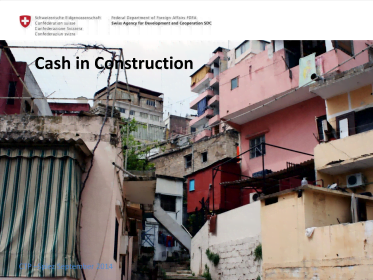
Cash in Construction
Presentation
This Powerpoint was used by SDC during a workshop on CTP and shelter/construction that took place in mid 2014. Click here to download a short introduction Powerpoint on Cash and Shelter from the same event.
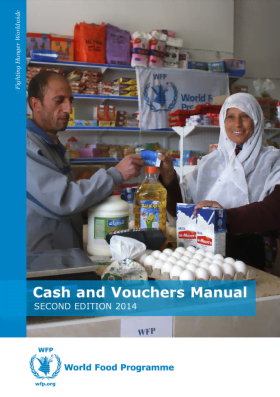
Cash and Vouchers Manual – Second edition
Guidelines and Tools
This second edition of the Cash and Vouchers Manual captures the latest corporately endorsed business processes and procedures, providing the most up-to-date tools (i.e. analytical, assessment, monitoring) that have been developed through close intra-departmental collaboration between Headquarters...
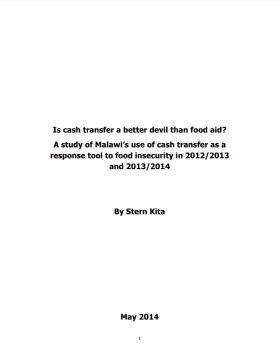
Is Cash Transfer a Better Devil than Food Aid? A study of Malawi’s use of cash transfer as a response tool to food insecurity in 2012/2013 and 2013/2014
Report
The 2004 Indian Ocean Tsunami is considered as the first humanitarian situation where cash transfers were used as an alternative to food aid. Since then, cash transfers have been used as a standalone response tool to disasters, or used in combination with food aid. Malawi piloted the use of cash...
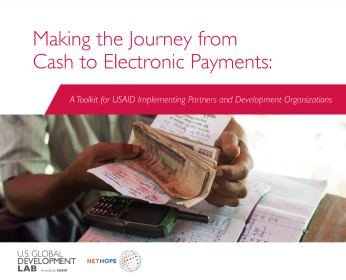
Making the Journey from Cash to Electronic Payments: A toolkit for USAID implementing partners and development organizations
Guidelines and Tools
This Toolkit was created for non-governmental relief and development organizations to guide them in their journey of transitioning from using cash payments to electronic payments in all operational and program payment streams. It is intended to be practical, easy to follow, bite-size, sectional, with...

Cash for Work Programmes Standard Operating Procedures – Lebanon
Guidelines and Tools
The document intends to define the roles of responsibilities of all the actors involved in the Cash for Work (hereinafter CfW) activities being developed by Action Contre la Faim (hereinafter ACF) and his partners in Lebanon.
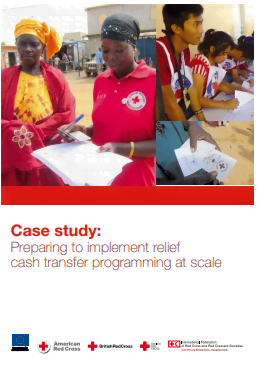
Case Study: Preparing to Implement Relief Cash Transfer Programming at Scale
Case Study
The International Federation of Red Cross and Red Crescent Societies (IFRC) worked with four pilot countries namely the Philippine Red Cross, the Vietnam Red Cross Society, the Senegalese Red Cross Society and the Chilean Red Cross, between May 2012 and December 2013 to support them with training and...
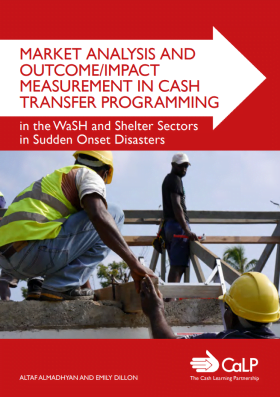
Economic Impact Study: Direct and Indirect Effects of the WFP Value-Based Food Voucher Programme in Lebanon
Report
This study examines the direct and indirect impacts of WFP’s e-card programme on the Lebanese economy. It is part of a broader United Nations initiative to assess the economic impacts of humanitarian assistance in Lebanon. The e-card programme is an important element of the international humanitarian...

CTP factsheet – Chilean Red Cross – cash transfer preparedness pilot
Report
The IFRC worked with four pilot countries between May 2012 and December 2013 to enable the National Societies to use cash transfer programming to address relief needs at scale, implementing it more rapidly and targeting a larger number of households. The Chilean Red Cross was one of the four...

CTP factsheet – Philippine Red Cross – cash transfer preparedness pilot
Report
The IFRC worked with four pilot countries between May 2012 and December 2013 to enable the National Societies to use cash transfer programming to address relief needs at scale, implementing it more rapidly and targeting a larger number of households. The Philippine Red Cross was one of the four...
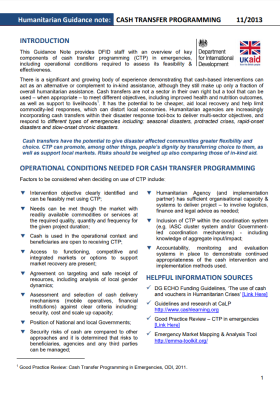
Humanitarian Guidance Note: Cash Transfer Programming
Guidelines and Tools
This Guidance Note from DfID provides an overview of key components of cash transfer programming (CTP) in emergencies, including operational conditions required to assess its feasibility & effectiveness. A brief guide to assist programme staff in writing funding proposals for cash-based interventions...

CTP factsheet – Senegalese Red Cross – cash transfer preparedness pilots
Report
The IFRC worked with four pilot countries between May 2012 and December 2013 to enable the National Societies to use cash transfer programming to address relief needs at scale, implementing it more rapidly and targeting a larger number of households. The Senegalese Red Cross was one of the four...
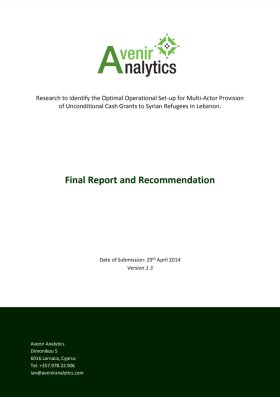
Research to Identify the Optimal Operational Set-up for Multi-Actor Provision of Unconditional Cash Grants to Syrian Refugees in Lebanon: Final report and recommendation
Report
This report contains the findings and recommendations from a 30 day research project commissioned by the cash working group (CWG) based in Lebanon, and more specifically the team tasked with the operational set-up. The Avenir research project team was engaged to identify the optimal operational set-up for...

Is Cash Transfer Programming ‘Fit for the Future’? – Executive Summary
Report
This summary presents the results of a 2013 research study entitled, Is Cash Transfer Programming ‘Fit for the Future’? The research was commissioned by the the CALP Network and undertaken by the Humanitarian Futures Programme (HFP), King’s College London. The project intends to understand...

CTP factsheet – Vietnam Red Cross – cash transfer preparedness pilot
Report
The IFRC worked with four pilot countries between May 2012 and December 2013 to enable the National Societies to use cash transfer programming to address relief needs at scale, implementing it more rapidly and targeting a larger number of households. The Vietnam Red Cross was one of the four...

Is Cash Transfer Programming ‘Fit for the Future’? – Final Report
Report
This report presents the results of a 2013 research study entitled, Is Cash Transfer Programming ‘Fit for the Future’? The research was commissioned by the the CALP Network and undertaken by the Humanitarian Futures Programme (HFP), King’s College London. The project intends to understand...
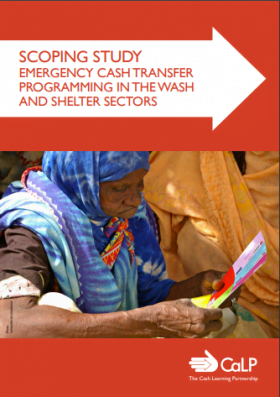
Scoping study – Emergency cash transfer programming in the WaSH and shelter sectors
Report
Over the past few years, the dialogue on cash transfer programming has progressed beyond initial debates about whether distributing cash and vouchers is a valid response modality at all to a general acceptance of their added value in appropriate contexts. Beyond the livelihoods and food...

Is Cash Transfer Programming ‘Fit for the Future’? – Annexes
Report
This Annex Package contains the full set of products developed in the course of a 2013 research study entitled, Is Cash Transfer Programming ‘Fit for the Future’? The research was commissioned by the Cash Learning Partnership (the CALP Network) and undertaken by the Humanitarian Futures Programme...

The CALP Network Level 2 Training – Module 1 – An Introduction to CTP
Guidelines and Tools
The objective of the Level 2 training is to strengthen the capacity of humanitarian actors in cash transfer programme design and implementation, to share recent research and learning, and encourage advocacy, institutionalisation and coordination in cash transfer programming (CTP). This training follows...
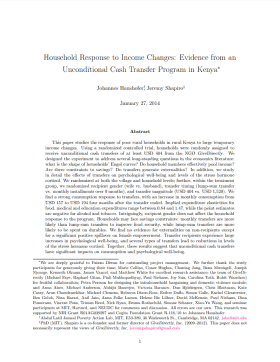
Household Response to Income Changes: Evidence from an unconditional cash transfer program in Kenya
Report
This paper studies the response of poor rural households in rural Kenya to large temporary income changes. Using a randomized controlled trial, households were randomly assigned to receive unconditional cash transfers of at least USD 404 from the NGO GiveDirectly. We designed the experiment to address...



